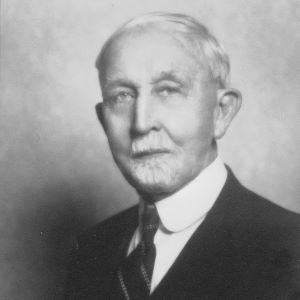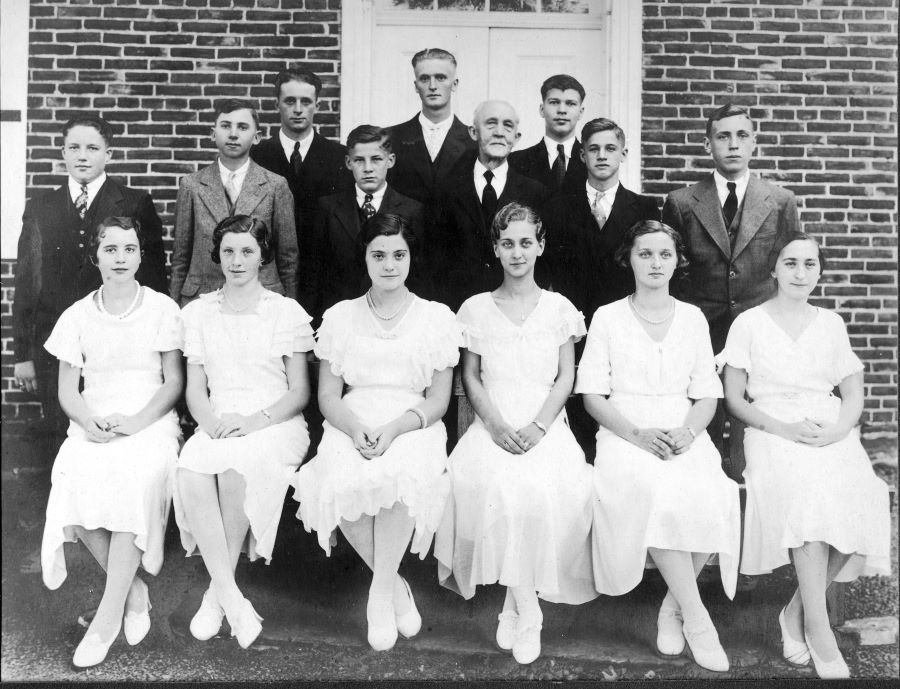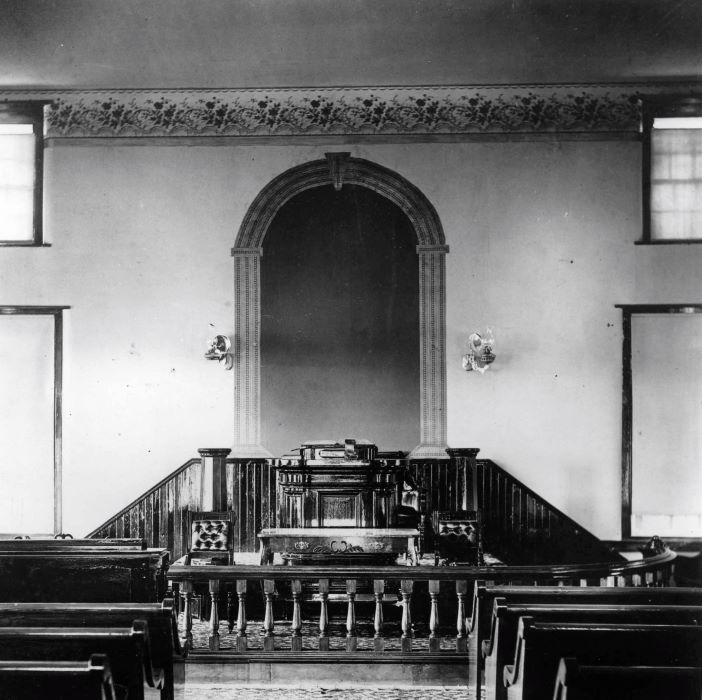Allen Fretz, Shepherd of Souls (Part 2)
Written by Forrest Moyer on August 26, 2020

Allen M. Fretz (1853-1943) was a longtime pastor and outstanding leader among local progressive Mennonites. In 1997, the MHEP Quarterly published a sketch of his ministry, written by grandson J. Herbert Fretz (1921-2013). We publish it now for the internet audience in two parts. The text is slightly rearranged from the original publication, and headings have been added.
50th anniversary at Deep Run, 1933
On a beautiful autumn day in the midst of the Great Depression – October 18, 1933, three meetings were held in the historic Deep Run (West) Meeting House, sponsored by the three congregations of which Allen M. Fretz was then pastor, Deep Run, Perkasie and Springfield. This day marked the fiftieth anniversary of his ordination into the ministry at Deep Run.
Large crowds taxed the capacity of the meeting house. In the afternoon the attendance was so large that it was necessary to install amplifiers to take care of the people who assembled outside. His aging colleague in the ministry, William S. Gottshall, delivered the morning message in his impressive way. William recalled that day fifty years before in 1883, when his father, Moses Gottshall, with deep emotion laid his hands on the head of Allen Fretz. William stated that he had a most peculiar feeling that day because for the first time he had become conscious that he, too, was being called to the same office, for which his father then ordained him a year and two days later. [Letter to A. M. Fretz, Oct. 16, 1928, Mennonite Heritage Center, Hist. Mss. 414.]
All preaching was in English now, but up to the time of Allen Fretz’s ordination all preaching was done in German and meetings at Deep Run (West) were held only every two weeks. It was Allen who suggested to the congregation that they begin regular Sunday meetings with some of them using the English language. By 1910 the deacons and trustees had passed a resolution to have all worship in English, with the condition that if he noticed any German worshipers present, he should feel free to use enough German to help them.
When the meeting house was erected in 1849, it was presumably considered an act of dignity to elevate the preachers “standing” so very high – William called it a “two story” pulpit. Allen remembered the time when he did not want to be considered so far above his people but thought it best to be nearer on a level with his people and so suggested that they lower the pulpit, which was accomplished. Allen also remembered that at the time of the fiftieth anniversary of the Deep Run congregation in 1899, he had suggested that a proper observance of this anniversary could best be expressed through other necessary alterations and improvements on the meeting house and yard.
In the afternoon other colleagues in the ministry assisted in this time of celebration such as Ernest J. Bohn of Souderton, Dr. Elmer E. S. Johnson of Bally, Arthur S. Rosenberger of Quakertown, and Daniel J. Unruh of Lansdale. While these men were sharing, Allen was thinking over the years of his work and worship with the many common, ordinary people he lived with and loved.
Perhaps he was thinking of such experiences as a letter addressed to him around the turn of the century, stating, “I feel like writing to you, Brother Fretz, about our circumstances. I am entirely out of place where I stand in the church as deacon. I will, therefore, resign.” Then follows a most simple but sincere confession of sin, concluding with these words, “Trusting in your forgiveness, I remain, Yours truly.”
Or perhaps, it was another letter from about the same time, both encouraging and complaining about faithfulness in the Lord’s work. This brother, who was standing by his pastor, wrote, “I wish to say that I am well satisfied with your work. That I believe you have done your utmost for the success of our church. But we as a body who compose the congregation are not united as we should be. So many of our members are here and there and everywhere…. The (Sunday School) teachers are wanting most always. The children come very often and are not welcomed or accommodated as they should be. I do not wish to be finding fault with anyone because I have mine…. I thought Brother ______ would make a good superintendent but I am disappointed. He is too much everywhere. He does not work enough for the success of our church and that is the trouble with so many of our members. They are here, as one has remarked, but their heart is somewhere else.” [A. M. Fretz Papers, Hist. Mss. 414, the source of many details in this article.]
But there were also moments of joy and accomplishment that came into Allen’s mind as he heard his brethren speak that afternoon.
The presence of other Christians from other denominations reminded him of that wonderful experience he had in September, 1913, when he was chosen to represent the Mennonites on the first Commission on Evangelism of the Federal Council of the Churches of Christ in America. For a few years the General Conference Mennonite Church had been a part of the Federal Council. During those days in September, he had met with other church leaders such as W. E. Biederwolf and J. Wilbur Chapman at the Hotel Chalfonte, Atlantic City, New Jersey. Unlike later “liberal” expressions of the Federal Council, these meetings were very evangelical and well balanced, expressing the need for both saving of souls and the betterment of society. In his report of the meeting to The Mennonite on September 20, 1913, he shared a statement from the Commission: “While social service is coming much to the front at this time, we must not lose sight of the vital thing – evangelism. The two must be combined. Vital Christianity will be active in social service. The church ought to let the mayors of the city know what attitude she takes in the campaign against vice and what help she can give to clean up the city. Every Christian is an evangelist. We need such evangelists rather than professional evangelists. The evangelism of today must be directed against major rather than minor sins.”

Third marriage
But other thoughts may have run through Allen’s mind this October day. Perhaps he wished that Anna would still be with him. His dear Anna had died ten years before, peacefully but suddenly, at noon, February 10, 1923 at the age of 62 years. The parting words to her children at her bedside were, “Remember Jesus, always Jesus first.” She had been a faithful wife since that March day in 1884 when she was united in marriage to Allen M. Fretz near her home in Ontario. She had been a very conscientious and arduous worker for the Lord.

After her death at Perkasie, days and weeks of loneliness had followed. During the next year or so, Allen Fretz, in addition to his ministry in the church, returned to his early calling as a teacher. He had taught school at the age of 19 and had continued in Bedminster Township from 1872 to 1884 as a teacher. After his marriage to Anna, he had given himself to the ministry and to farming. Now that Anna passed away, he spent more time in teaching public school and had even attended Teachers’ Institutes. This was also his way of turning his mind away from his loneliness. He told someone in 1925 that teaching school “helped to keep him young in spirit and bright on textbook subjects.”
Finally in June, 1925, with the counsel of his children, he married for the third time, though more than 70 years of age. Why not? He was still actively engaged in the ministry and his health was good. When his children found out who the bride would be, they were quite happy. She was none other than Mrs. Amanda Fretz of Hatfield, whose first husband had been his brother, Mahlon, who had died suddenly in 1907. Her maiden name had been Fretz, her first husband was Mahlon Fretz, and her second husband after 18 years of widowhood would be Allen Fretz. She would always bear the name of Fretz. She was a great help and comfort to Allen for the rest of his days. Again life seemed to pick up meaning and his ministry was the better for it.

A last sermon at Souderton, 1943
The chilly winds of February, 1943, did not keep the aged minister in his 90th year from attending the 50th anniversary meetings of Zion Mennonite Church in Souderton. It was war time and fuel was rationed but his son Ely took him to the meeting. Here again in the Souderton pulpit for the last time in his life, he would preach the word. [Author’s interviews with Ely R. Fretz, 1973 and E. J. Bohn, ca. 1990.]
Allen’s record book shows that he had preached regularly until November, 1942. He had withdrawn from the full ministry at Deep Run in 1940, when Russell L. Mast who had graduated from Hartford Seminary, Connecticut, was called as pastor. Allen continued as elder [bishop] until 1942, preaching his last sermon at the October communion at Deep Run. He died April 26, 1943.
He had faithfully served his people at Deep Run for nearly 60 years, 1883 to 1942. He had also served as minister at Souderton [Zion Mennonite] 1893-1909, Allentown [First Mennonite] 1910 and 1912, Springfield 1914-1938, and Perkasie [Bethel Mennonite] 1919-1942. He had assisted at Pottstown, Bowmansville in Lancaster County and Grace Mennonite, Lansdale. In the Eastern District Conference he had served as secretary from 1913 to 1927. Along with N. B. Grubb and A. B. Shelly, he had been one of the founders of the first English General Conference periodical, The Mennonite, in 1885. He had attended most of the triennial General Conference sessions from 1887 to 1933, and served in various committees during those years.
At the close of his long ministry, it was estimated that he had delivered about 9,000 sermons, performed 219 marriage ceremonies, and officiated or assisted at almost 700 funerals. It was also estimated that he had baptized almost 400 persons in the various congregations. In the 17 years from 1893 until 1910, when he drove by horse and carriage or sleigh between Souderton and Deep Run, it was estimated that he covered a total distance of about 9,000 miles. [Computations based on A. M. Fretz pastoral record books, covering the period from 1883 through 1942.]

Tribute by Winfield Fretz
But such statistics do not tell the real story of his long ministry. After his death on April 26, 1943, a cousin, Dr. J. Winfield Fretz, of Bethel College, North Newton, Kansas, wrote this fitting testimonial in The Mennonite, May 4, including lines from a poem by Oliver Goldsmith (1728-1774):
A man he was to all the country dear,
And passing rich with forty pounds a year;
Remote from towns he ran his Godly race,
Nor e’er had changed, nor wished to change his place….
This, in a poetic way, sums up the long and beautiful life of the Rev. Allen M. Fretz who was laid to rest on Thursday afternoon, April 29, 1943, at the Deep Run New Mennonite meeting house where he had been a lifelong attendant and pastor for sixty years. Commenting on the fact that he had served the same church for such a long period, he said several years ago: “My call to the ministry in 1883, I felt to be Divine indeed, but as it came largely through the medium of my relatives and friends of childhood, youth and service as teacher and Sunday School worker, and as the Lord gave me evidence of His blessing on my efforts in behalf of my home church, I felt, too , that this was to be the field of my labors till sunset. So you have the reason why I never changed, nor chose to change my place…”
The passing of Allen Fretz of the Mennonite Church is truly like the falling of a mighty oak which leaves a vacant space against the lonesome sky. He was considered the Dean of ministers of Eastern District Conference because of his long years of service and his fatherly counsel…. He was not a seeker of offices, although he held many. His strength lay in the sterling quality of his quiet personal life and conduct. Throughout his life he demonstrated the beauty of simplicity in word, in deed, and in thought…. He was truly a shepherd of…souls. Many lives were enriched, many hearts warmed by his long gracious teaching and preaching ministry. His tall gaunt figure, grey hair, white beard and blue eyes; his soft spoken but crystal-clear voice and sympathetic smile as he stood behind his lofty pulpit, girded by two pillar-like posts, will never be forgotten by those who had the privilege of claiming him as their pastor. The poet’s words describe him well:
At church with meek and unaffected grace,
His looks adorned the venerable place;
Truth from his lips prevailed with double sway,
And fools, who came to scoff, remained to pray.

J. Herbert Fretz (1921-2013), of Goshen, IN, was a grandson of Allen M Fretz and grew up in the Grace Mennonite Church, Lansdale, PA. He was pastor of the Deep Run West Mennonite Church, Bucks County, in the late 1940s, and was later on the staff of Mennonite Biblical Seminary, Elkhart, IN, for many years. Herbert donated Allen Fretz’s papers to the Mennonite Heritage Center in 2002, along with his own historical and research collection (Hist. Mss. 414).


